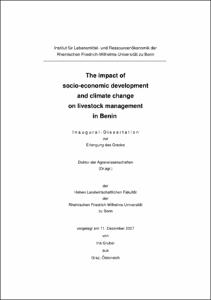Gruber, Ina: The impact of socio-economic development and climate change on livestock management in Benin. - Bonn, 2008. - Dissertation, Rheinische Friedrich-Wilhelms-Universität Bonn.
Online-Ausgabe in bonndoc: https://nbn-resolving.org/urn:nbn:de:hbz:5N-13889
Online-Ausgabe in bonndoc: https://nbn-resolving.org/urn:nbn:de:hbz:5N-13889
@phdthesis{handle:20.500.11811/3248,
urn: https://nbn-resolving.org/urn:nbn:de:hbz:5N-13889,
author = {{Ina Gruber}},
title = {The impact of socio-economic development and climate change on livestock management in Benin},
school = {Rheinische Friedrich-Wilhelms-Universität Bonn},
year = 2008,
volume = 3332,
note = {Livestock management is a rapidly changing sector in developing countries due to increasing demand for animal products and changes in the availability of common resources. Moreover, livestock management is important as it can contribute to achieving the Millennium Development Goals with regard to poverty alleviation, health improvement, and environmental sustainability. In this thesis, the impact of three major driving forces (population growth, increasing income, and climate change) on livestock husbandry in Benin is analysed. This study aims to contribute to and deepen the general understanding of livestock management in Benin and its possible developments in order to benefit from the potential of the sector.
The methodological approach of triangulation is used both for the analysis of the current situation and for the future development. To capture the status quo, two surveys were conducted among livestock keepers and local experts supplemented by secondary data. To identify possible future development paths, agricultural development theories, experiences in other developing countries, and the results of the expert survey concerning future trends have been used. The findings of this analysis enter the quantitative agricultural sector model BenIMPACT which has been further developed and applied to the livestock sector for scenario analysis.
The current situation in livestock husbandry is characterised by extensive production methods depending heavily on the common resources of water and pasture. The low productivity is accompanied by a multi-purpose motivation for livestock keeping that is not only income-orientated. The survey reveals that the major production problem is the inadequate and insufficient supply of fodder, and market behaviour of livestock producers differs according to region. The findings of the study concerning future development disclose that population growth has a greater impact on the livestock sector in Benin than increasing income. Shifts in function and species, geographical location, input intensity, and higher market orientation in the course of development are to be expected, as has been seen in other developing countries. The BenIMPACT results confirm the importance and necessity of natural resources and the relevance of increasing land scarcity. Although the latter aspect could be an incentive to establish (semi-)intensive livestock production, the model indicates that unidentified costs currently prohibit semi-intensive production. Furthermore, the agricultural sector model reveals that different conservation measures for forests will impose different regional consequences on livestock distribution and income. Generally, livestock management will be more differentiated in the future according to region and input intensity due to regional comparative advantages.},
url = {https://hdl.handle.net/20.500.11811/3248}
}
urn: https://nbn-resolving.org/urn:nbn:de:hbz:5N-13889,
author = {{Ina Gruber}},
title = {The impact of socio-economic development and climate change on livestock management in Benin},
school = {Rheinische Friedrich-Wilhelms-Universität Bonn},
year = 2008,
volume = 3332,
note = {Livestock management is a rapidly changing sector in developing countries due to increasing demand for animal products and changes in the availability of common resources. Moreover, livestock management is important as it can contribute to achieving the Millennium Development Goals with regard to poverty alleviation, health improvement, and environmental sustainability. In this thesis, the impact of three major driving forces (population growth, increasing income, and climate change) on livestock husbandry in Benin is analysed. This study aims to contribute to and deepen the general understanding of livestock management in Benin and its possible developments in order to benefit from the potential of the sector.
The methodological approach of triangulation is used both for the analysis of the current situation and for the future development. To capture the status quo, two surveys were conducted among livestock keepers and local experts supplemented by secondary data. To identify possible future development paths, agricultural development theories, experiences in other developing countries, and the results of the expert survey concerning future trends have been used. The findings of this analysis enter the quantitative agricultural sector model BenIMPACT which has been further developed and applied to the livestock sector for scenario analysis.
The current situation in livestock husbandry is characterised by extensive production methods depending heavily on the common resources of water and pasture. The low productivity is accompanied by a multi-purpose motivation for livestock keeping that is not only income-orientated. The survey reveals that the major production problem is the inadequate and insufficient supply of fodder, and market behaviour of livestock producers differs according to region. The findings of the study concerning future development disclose that population growth has a greater impact on the livestock sector in Benin than increasing income. Shifts in function and species, geographical location, input intensity, and higher market orientation in the course of development are to be expected, as has been seen in other developing countries. The BenIMPACT results confirm the importance and necessity of natural resources and the relevance of increasing land scarcity. Although the latter aspect could be an incentive to establish (semi-)intensive livestock production, the model indicates that unidentified costs currently prohibit semi-intensive production. Furthermore, the agricultural sector model reveals that different conservation measures for forests will impose different regional consequences on livestock distribution and income. Generally, livestock management will be more differentiated in the future according to region and input intensity due to regional comparative advantages.},
url = {https://hdl.handle.net/20.500.11811/3248}
}






